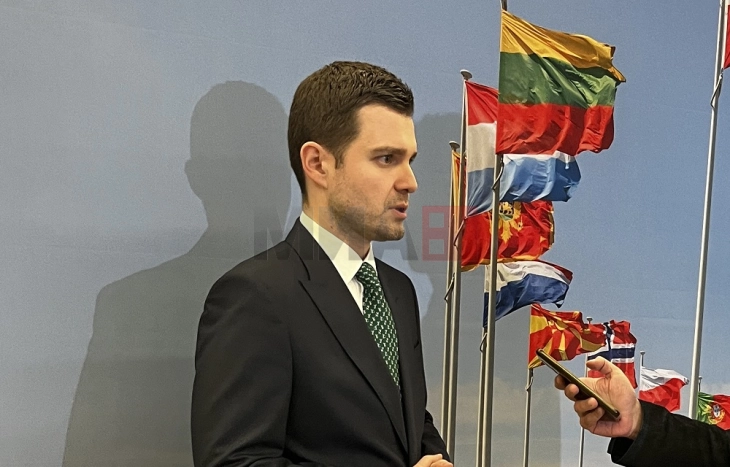Mucunski: Too early to discuss Ukraine's accession to NATO
- Our country has a positive approach to NATO's open-door policy for new members, but it is too early to discuss Ukraine's membership in the Alliance, Minister of Foreign Affairs and Foreign Trade Timcho Mucunski told MIA regarding Kiev's call for an immediate invitation to join NATO.

Brussels, 3 December 2024 (MIA) – Our country has a positive approach to NATO's open-door policy for new members, but it is too early to discuss Ukraine's membership in the Alliance, Minister of Foreign Affairs and Foreign Trade Timcho Mucunski told MIA regarding Kiev's call for an immediate invitation to join NATO.
"As a country, we generally have a positive approach to the open-door principle, but it is a decision that is made by consensus, which requires a more detailed discussion among members. It is too early to discuss such a thing," said Mucunski, who is paying a working visit to Brussels on Tuesday and Wednesday to attend a regular meeting of NATO foreign ministers.
Ukraine is in the focus of the NATO-Ukraine Council meeting in the form of a working dinner as part of the ministerial meeting, which is also attended by Ukrainian Foreign Minister Andrii Sybiha and the new EU High Representative for Foreign Affairs and Security Policy Kaja Kallas.

According to Mucunski, NATO ministers will discuss with Sybiha and Kallas the latest developments related to the Russian aggression against Ukraine, steps taken by the Alliance to assist the country, as well as the views of the allies regarding the implementation of the conclusions of the July Summit in Washington.
The ministerial meeting began with a session of the North Atlantic Council at the level of foreign ministers, which focused on the ongoing conflict in the Middle East and its impact on Euro-Atlantic security. King Abdullah II of Jordan also attended the session.
Mucunski said the meeting discussed major political and security challenges related to the developments in the Middle East, which affect global stability and global peace.
"In that regard, insights were shared and there was a discussion on how NATO should position itself on these key issues in the coming period," Mucunski added.

As regards proposals to exceed the target of investing at least 2% of GDP in defence, Mucunski said that was the target currently set by the Alliance, adding that the country has met the target.
"We are aware that there is a deteriorating and volatile security situation globally. We will work with allies to adapt to the reality we face," he noted.
On the sidelines of the meeting in Brussels, Minister Mucunski met with his Slovenian counterpart, Tanja Fajon. He said the talks focused on the excellent relations the two countries have as NATO allies, as well as the mutual partnership, which is not only political, but is also demonstrated in practice in the area of defence and military cooperation.
"We also talked about the challenges we face as a country that aspires to join the European Union. I thanked Slovenia for the principled support it has given us on that path, and we had an active dialogue to find solutions to all the challenges that face us as a country, but also as equal members of the Alliance," Mucunski said.

Previously, the Slovenian Ministry of Foreign and European Affairs posted on X that at the meeting, the ministers discussed the European perspective of North Macedonia.
“Slovenia has been a strong supporter of EU enlargement, and we will do our best to help you fulfil your commitments to meet the conditions for membership,” Fajon said at the meeting.
On the sidelines of the meeting, Minister Mucunski is scheduled to hold several bilateral meetings with his counterparts attending the meeting, including British Minister of State for Europe, North America and Overseas Territories, Stephen Doughty, and Canadian Foreign Minister, Mélanie Joly.
The NATO ministerial continues on Wednesday with a meeting of the North Atlantic Council, which according to Secretary General Mark Rutte will discuss the issue of increasing Russian aggression against NATO Allies.
Photo: MIA archive







